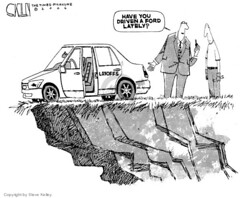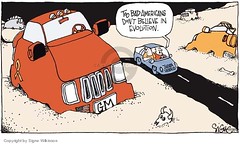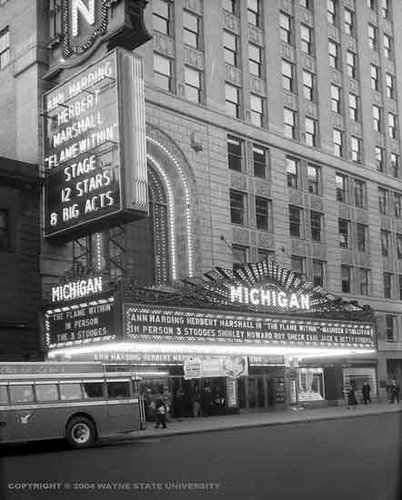Tales of two cities: Seattle and Detroit
 Editorial cartoon by Steve Kelley, New Orleans Times-Picayune.
Editorial cartoon by Steve Kelley, New Orleans Times-Picayune.is the title of an interesting column by James Vesely in today's Seattle Times, written on the eve of the Super Bowl, featuring the Seattle Seahawks and the Pittsburgh Steelers, and being played in Detroit. He makes the point that Detroit today is where Seattle was 60 years ago, and Detroit 60 years ago was at the peak of its power.
It's worth reading.
But while he comments on the necessity of quality political leadership (which Detroit has lacked for all but a brief period in the last 30 years, note that longtime mayor of Detroit Coleman Young had a lot of similarities to longtime mayor of DC, Marion Barry), he doesn't comment on the quality of the local business leadership.
In Detroit, that local business leadership is centered around the auto industry (the best of the banks have been, with one exception, merged out of Detroit) and runs global businesses that appear to be doing okay overseas (although this always waxes and wanes) but are on the brink of failure in the U.S. market. GM and Ford (and previously Chrysler, which is now German-owned) have been unable to change the way they think and approach their U.S. business.
This comes at great cost to their businesses sure, but also to the communities in which their businesses are based. When Ford announced plant closures a couple weeks ago I was particularly shocked at two of the plants chosen: Wixom, which when the Lincoln Continental was supreme, this plant generated 33% of Ford's annual profit in North America; and Atlanta, where the Ford Taurus was built--this car led Ford's success in the late 1980s and early 1990s, and for quite some time outsold the best of the Japanese marques.
The failure of the U.S. automobile industry has consigned Detroit, now a one-trick pony economically, to oblivion. Of course, as I say, it make sense that Detroit is probably the least successful traditional center city in the U.S. because the end game of an automobile centric development and planning paradigm is a denuded city that fully yields to the car. In other words, even if the U.S. auto industry continued to be successful, maybe Detroit would still be bad off, covered with even more freeways and roads. But at least people would be employed, and the economy would be thriving, but with smoggier air.
The Detroit Lions are a perfect example of the failure to be flexible and successful. When is the last time that team won a Super Bowl? Uhh, never. And they are owned by the Ford Family. (On the other hand, you could counter with two other Detroit industrialists, Ralph Wilson, who has owned the Buffalo Bills, including during their periods of great success, and William Davidson, who owns the Detroit Pistons and the Tampa Bay hockey team, both successful, winning enterprises.)
I know that it's contradictory that someone as pro-transit as myself grieves over the failure of the U.S. auto industry, but I see the impact on Michigan. I was fortunate enough to go to school at the University of Michigan, in a state that supported higher education to the point where the state has two other great schools, Michigan State University, one of the original agriculture-oriented land grant colleges, and Wayne State University, an urban university mostly commuter-oriented (like City College in NYC). These schools could not be created today, given Michigan's economic problems.
Cities like Flint (subject of that Michael Moore film), Pontiac (on the brink of financial receivership), Saginaw, and other cities across the state, once were centered around thriving local industrial plants employing tens of thousands of people, and now are sad, forlorn places, quite possibly with no future. (Flint was where GM was founded and was where the UAW forced GM to recognize the union, as a result of successful "Sitdown Strikes." Lansing was home to Ransom Olds, an innovator in the industry, and creator of the now deceased Oldsmobile. Pontiac was home to independent car companies bought up by what became GM.)
What I figured out in college, and never wrote about it (had I maybe I'd be a columnist for the NY Times like Thomas Friedman instead of doing a blog) is what I called the difference between an economy or industries based on an "extensive" vs. an "intensive" use of resources. This is about using more--and started with the push in the U.S. for "Manifest Destiny" and westward expansion to the Pacific--versus using what you have better and more efficiently. The more resources you use per unit of product produced, the less money you make. That's basic microeconomics (managerial/management accounting).
 While I don't think that hybrids really contribute all that much in the way of substantive change other than letting their owners feel superior, this editorial cartoon by Signe Wilkinson of the Philadelphia Daily News communicates well about the necessity of change at the industry level.
While I don't think that hybrids really contribute all that much in the way of substantive change other than letting their owners feel superior, this editorial cartoon by Signe Wilkinson of the Philadelphia Daily News communicates well about the necessity of change at the industry level.The Toyota Production System, one of continuous process improvement, is a system based on an intensive approach, while the big iron mass production philosophy of the U.S. automobile industry reflects an extensive resource approach. Thirty years after the oil shock (which led to massively increased gasoline prices and economic depression in Michigan) in the early 1970s, the U.S. automobile industry still takes twice as long to design a car than the Japanese companies. And they are falling further and further behind as a result. (Note that GM has had a joint venture with Toyota for 20 years and they still haven't been able to adapt substantively.)
Seattle is fortunate that it's on the West coast, and it seems as if coastal cities have some advantages in terms of attractiveness and success. But they also lucked out with Bill Gates, Paul Allen, and the microcomputer age... Note that Detroit had a computer company, Burroughs, which may still have been able to be successful--on the other hand note the example of DEC--had they not been merged away with Sperry into Unisys, and relocated to Philadelphia. But maybe it wasn't in the cards for Detroit and the computer industry given Detroit's "extensive" way of looking at the world. Remember GM's acquisition of EDS for a time, and then their foray into computer-controlled robots? Meanwhile the Apple computer was created in a garage. As a style, garage-oriented tinkering--the way that Henry Ford, the Lelands, the Dodge Brothers, Ransom Olds, and others created the industry--has long since passed from the Detroit industrial scene.
Today's Super Bowl, features a new economy city, Seattle, versus an old economy city, Pittsburgh, in another old economy city, Detroit. I am thankful for all that the new economy city brings to me (despite the multiple crashes that Windows wreaks on me daily) but I continue to hope for the old economy center cities.
I have a line that compared to Washington, DC, from the standpoint of urban revitalization, cities like Pittsburgh and Baltimore have what I call "a desperate willingness to experiment," because they have no other choice.
But industries and stakeholders in cities like Detroit still may not believe that it is up to them to be desperately willing to change, otherwise they have no future at all.
What kills me is that millions of people will watch this game tonight, with incredible levels of intensity, and many will be disappointed to great depths, because "their team lost." Why don't they care about the future of their locales, and get involved, with the same level of intensity? Why do sports matter so, and not the future of the U.S. economy?
Meanwhile, professional sports teams like the Pittsburgh Steelers and the Seattle Seahawks just play again next year, and cities like Detroit and Pittsburgh continue to decline.
 Michigan Theater, Woodward Avenue, Detroit (back in the day). (My father's dentist office was just down the street.) Wayne State University photo uncovered by City Skip.
Michigan Theater, Woodward Avenue, Detroit (back in the day). (My father's dentist office was just down the street.) Wayne State University photo uncovered by City Skip.Index Keywords: urban-revitalization



0 Comments:
Post a Comment
<< Home